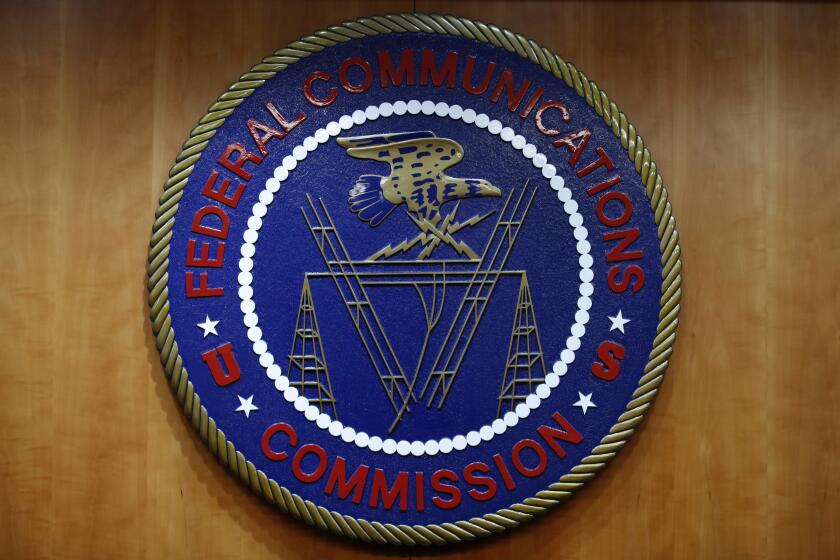Roberts Appears Open to New Interpretations
WASHINGTON — Chief justice nominee John G. Roberts Jr. carefully avoided taking sides on many issues Wednesday, but he went out of his way at his Senate confirmation hearing to put some distance between himself and justices Antonin Scalia and Clarence Thomas -- the Supreme Court’s two staunchest conservatives.
And the issue was a basic one, with possibly great import for the future: How should a high court justice interpret the Constitution?
Scalia and Thomas proudly call themselves “originalists.” They say the Constitution should be interpreted strictly, based on its literal words and its original history.
Like other conservatives, they shun the notion of a “living Constitution.” They say their approach is faithful to the Constitution as it was written in 1787 and amended since then. Scalia says, only half-joking, that he believes in a “dead Constitution.”
This look to the past leaves no room to consider such contemporary concepts as a right to die or equal rights for gays.
Roberts pointedly said Wednesday that he disagreed with this narrow originalist approach and would apply the Constitution in light of today’s concerns and understandings.
“I depart from some views of original intent,” he told the Senate Judiciary Committee.
Words such as liberty or equality should not be given a “cramped or narrow construction,” based on “just the conditions at the time” when the Constitution was written, he said.
“The framers chose broad terms, [with] a broad applicability, and they state a broad principle,” he told Sen. Arlen Specter (R-Pa.), the committee’s chairman.
He noted that the preamble to the Constitution says the document was designed “to secure the blessings of liberty to ourselves and our posterity.”
“It applies to modern times,” he said. The Founding Fathers intended the Constitution “to apply to changing conditions. And I think that in that sense, it is alive ... and applies down through the ages,” Roberts said.
It is certainly not clear how Roberts would decide controversies such as abortion rights, gay rights or the right to die. He repeatedly refused to state his view or comment on most past rulings on those disputes.
But his comments hint that he is at least open to a future decision saying the Constitution protects a right to die, or gives gays protection from discrimination.
Roberts also endorsed the 1965 decision in Griswold vs. Connecticut, which first spoke of a right to privacy in the Constitution. The ruling struck down an archaic state law that prohibited the use of contraceptives, but it has remained controversial because the right to privacy formed the basis for the Roe vs. Wade ruling in 1973, which established a woman’s right to abortion.
Roberts said much during the two days of questioning that should reassure conservatives. He emphasized that the court has a “limited role” in deciding social controversies, and he insists judges should not “make law.”
He also said the Constitution should be read in light of the “nation’s history, traditions and practices.”
And several conservative lawyers said Wednesday that they were not troubled by his comments about interpreting the Constitution.
“What I think Roberts was saying was that the framers were smart enough to take into account changes in circumstances,” said Leonard Leo, executive vice president of the Federalist Society. “I don’t read all that much into what he said.”
Leo added, “It’s right to say he believes privacy is protected, and the language of the Constitution is broad enough to capture modern problems. But he would not take these broad principles and rewrite the Constitution.”
Whether to focus on the past or the present often divides the Supreme Court.
Scalia has scoffed at the notion of a right to die and insisted the justices have no business even discussing such claims.
But most of his colleagues have taken a more flexible view of the nation’s founding charter. When faced with the question of whether to maintain the death penalty for mentally retarded defendants, the majority barred such executions in 2002, saying this was “cruel and unusual punishment” in light of “evolving standards of decency” in America.
Scalia and Thomas dissented, along with the late Chief Justice William H. Rehnquist. They said such executions would not have troubled the authors of the Constitution, and therefore, they should not be deemed unconstitutional today.
Two years ago, in a victory for gay rights, the court struck down a Texas law that made sex between gays a crime. Justice Anthony M. Kennedy, speaking for the majority, said the law violated the constitutional right to liberty in light of contemporary American values. Rehnquist, Scalia and Thomas dissented.
Scalia said he feared this evolving notion of liberty meant the high court would soon rule that gays had a constitutional right to marry, a prospect that has divided the nation.
The debate largely concerns a few words in the 14th Amendment, adopted in 1868, after the Civil War. It says states may not “deprive any person of life, liberty, or property, without due process of law; nor deny [them] the equal protection of the laws.”
Roberts said these words, read literally, might mean only that the government may not arrest and hold someone without giving them due process of law. He said he believed the protection for liberty went well beyond that interpretation and included protections for fundamental rights.
For example, Roberts cited the court’s decision in 1925 that struck down a state law that required children to enroll in public schools. The justices said parents had the “personal liberty” to send their children to the school of their choice, including a private or parochial school.
As was the case when the committee began questioning Roberts on Tuesday, Democrats spent much of Wednesday’s hearing trying to pin him down on issues such as abortion and civil rights. As he did Tuesday, he dodged most of their inquiries.
At one point, he refused even to answer whether a mentally competent dying person had a right to end his life. The Supreme Court answered that question in 1990. In the case of Nancy Cruzan, the justices agreed that all people have a right to refuse unwanted medical treatment.
The harder issue, in Cruzan’s case as well as the recent one involving Terri Schiavo, arises when patients cannot speak for themselves.
Roberts refused to tip his hand. “There are cases involving disputes between people asserting their rights to terminate life, to remove feeding tubes, either on their own behalf or on behalf of others,” he said.
“Those are issues that will come before the court, and I will confront those issues in light of the court’s precedents with an open mind.”
More to Read
Get the L.A. Times Politics newsletter
Deeply reported insights into legislation, politics and policy from Sacramento, Washington and beyond. In your inbox three times per week.
You may occasionally receive promotional content from the Los Angeles Times.











